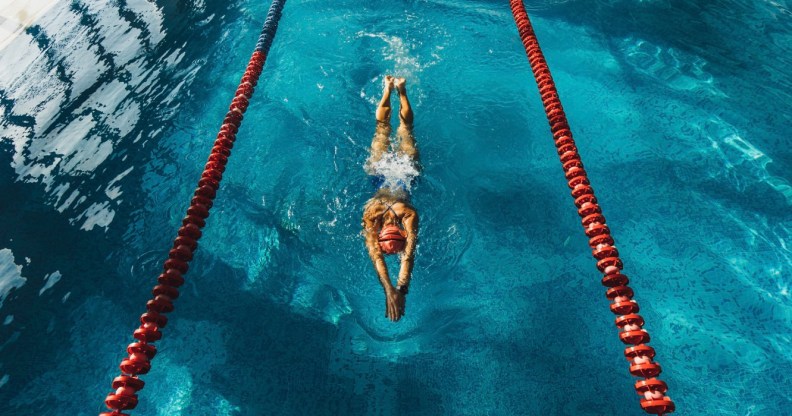Swim England bans trans women from female competitions

Swim England updates trans policy, forcing trans swimmers into an ‘open’ category. (Oleg Breslavtsev/Getty Images)
Swim England updates trans policy, forcing trans swimmers into an 'open' category. (Oleg Breslavtsev/Getty Images)
Swim England has updated its policy on trans and non-binary athletes, effectively forcing trans swimmers out of the “female” category and into an “open” one in competitive events.
The new policy, which the swimming body claims recognises the “fairness of competition”, would see only cis women taking part on female teams, while a new “open” category would exist for non-binary or trans women swimmers.
“It is widely recognised that fairness of competition must be protected and Swim England believes the creation of open and female categories is the best way to achieve this,” the swimming body wrote in a statement on its website.
“The updated policy ensures there are entry-level competitive opportunities for transgender people to participate in the majority of our disciplines within their gender identity.”
The new policy, announced on Monday (3 April), contains provision for athletes to self-ID at low-level “unlicensed” events, such as recreational races. However, timings and scores posted at these events will not be applicable to Swim England rankings or eligible as records.
“Swim England believes that the restriction of certain competition to birth sex females to be justified and proportionate in the pursuit of fair competition,” it said, adding that the new policy has “inclusion and fairness at its very heart”.
Swim England also confirmed that the policy only refers to its own competitions, and will implemented on 1 September this year.
Trans youth denied right to ‘compete as themselves’
Trans youth charity Mermaids has described the Swim England policy update as “disappointing”.
“While trans kids can play authentically in non-competitive environments, the policy fundamentally denies trans girls the right to compete as themselves,” it said.
“We call on Swim England to reverse its decision to ban trans girls from competing with their peers, and make sport a welcome, inclusive space for trans youth.”
‘Everyone deserves a chance to take part’
UK trans charity Gendered Intelligence calls the move by Swim England “disheartening”.
“The creation of an ‘open’ category does nothing for safety and fairness, and only serves to send a message that trans athletes are not welcome,” says a spokesperson.
“There is no evidence that the participation of trans women – who make up a vanishingly small minority of competitive athletes – has had any negative impact on competitive play or on player safety.”
They say lack of access to equipment and training is far more influential on women’s sport.
“We’re especially concerned about what these kinds of decisions will mean for the future of grassroots sport. Trans people already have significantly worse access to sport and physical activity,” Gendered Intelligence adds.
“If sporting bodies continue to bow to political pressure we fear that the exclusion of trans people – particularly trans women – will expand beyond high-level competition to youth activities and casual play.
“Everyone deserves a chance to take part. Nobody should be barred from sport because of who they are.”
Swim England’s new policy comes as World Athletics has banned trans women who have been through puberty from taking part in female competitions.
The governing body’s president, Sebastian Coe, explained: “Many believe there is insufficient evidence that trans women do not retain advantage over biological women, and want more evidence that any physical advantages have been ameliorated before they are willing to consider an option for inclusion into the female category.”
In 2022, the International Olympics Committee (IOC) dropped its blanket rules on trans athletes, saying that after extensive research, it no longer deemed testosterone levels the most important factor in determining whether trans women should be allowed to compete.
However, in dropping its own policy, the IOC encouraged individual sports to set their own rules. As a result, some have introduced strict rules effectively banning trans women, such as swimming body FINA.
Trans athletes heavily criticised the move by FINA, explaining that the ban on trans athletes who have been through puberty is “outrageous and completely unrealistic”.
Swimmer and trans activist Schuyler Bailar called the policy “transphobic”, noting that the age limit of 12 to have transitioned or gone on puberty blockers effectively excludes all trans women and girls in the US.
“This is not about preserving fairness, this is not about protecting women’s sports, it is about excluding trans people,” he said in an Instagram video.
“This is transphobia incarnate and it has to stop”.

